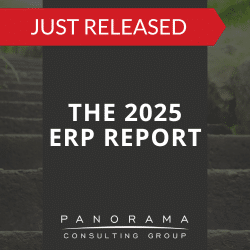A system integrator is a company that specializes in bringing together various hardware and software products from multiple vendors and ensuring those components seamlessly work together. During an enterprise resource planning (ERP) implementation, this is especially important.
A Panorama ERP consultant can help you select the ideal system integrator (SI) for your project. Then, we’ll work alongside this SI throughout the implementation.
Today, we’re taking a closer look at the role of an SI and revealing why this role is so important to ERP implementation success.
What is a System Integrator in an ERP Project?
The early stages of any ERP project are all about ERP evaluation and selection. With more types of ERP systems and enterprise software available today than ever before, many organizations are taking a best-of-breed approach. In other words, they select multiple systems, which they integrate to support their enterprise strategy.
These organizations often choose to bring a system integrator on board to help facilitate this integration. In addition to integration services, many SIs also act as value-added resellers (VARs).
Technology Assessment Case Study
We assessed the organization’s existing systems to determine which should be migrated into a centralized ERP system and which should continue to stand alone as a best of breed.
4 Benefits of Hiring a System Integrator
1. Simplifies Complex ERP Projects
If you can purchase software licenses straight from the vendors themselves, then why does it make sense to buy them through a SI or VAR? Won’t this add a middleman and further complicate the process?
In reality, there are many benefits to working with a third party. For instance, it’s especially beneficial when you’re preparing to undergo a complex or widespread implementation.
Imagine your business plans to implement an ERP system in all of its offices across the country. Of course, you can go straight to the ERP vendor and purchase those licenses, but you must consider if that ERP vendor has the resources and expertise to integrate all the components of your complex IT infrastructure.
A system integrator acting as a VAR can provide a specialized skillset while delivering the same product as the ERP vendor, at a comparable price.
2. Provides Expertise Outside of the ERP Realm
Not only are ERP-specific system integrators knowledgeable about specific ERP vendors and products, but they’re also used to navigating the IT world as a whole.
For example, system integrators work with many original equipment manufacturers (OEMs) and aren’t tied to a particular company. In addition, they’re up to date on recent developments, innovations and providers, even those that are just entering the scene.
As impartial IT experts, they can help you evade the common workplace politics and hierarchies that threaten to limit information flow. You can count on an SI to deliver honest feedback and provide sensible recommendations to move your company forward.

3. Quickens the Learning Curve
A system integrator’s intricate knowledge of ERP software can also prove invaluable in the training phase.
Employees are already bogged down with their day-to-day work and deadlines, and they don’t exactly have time to troubleshoot a buggy system or navigate workarounds to common issues. That said, we recommend hiring an SI to facilitate ERP system testing and end-user training in concert with your ERP software consultant.
Your SI will provide training materials for navigating the fully integrated IT environment, and your ERP consultant will customize these materials to ensure they’re suited for your unique business processes. When you have an SI and consultant working together to equip employees, this frees up your internal team from shouldering the full burden of system design, implementation, testing and training.
4. Reveals Key Legacy Integrations
Business transformation often involves a complete overhaul of processes and technology. However, there are many components and subsystems that may remain in place amid the adjustments.
An SI is responsible for ensuring these systems are still as functional and useful as ever before. In other words, an SI ensures your ERP investment fits seamlessly with your existing systems.
They can help you piece together the data, architecture and other components you need, based on the limitations of your legacy systems.
For instance, you may want to keep your current accounting systems and augment the setup with features delivered through a cloud ERP system. An SI can help you accomplish this, so you don’t have to abandon your existing hardware and assets as you embrace more modern technology. This approach can save your company money and help you expand functionality, all at once.
System Integrators and ERP Consultants: A Successful Partnership
There are many different teams and resources you’ll need on your ERP project team as you roll out new ERP software. Regardless of the size or scope of your project, an ERP consulting team and a system integrator should make that list.
What is a system integrator? In short, it’s a company that can help you integrate and manage all your IT assets. With the right SI in place, you can rest assured that the solutions you implement result in a seamless integration that encourages user adoption and drives continued momentum.
Looking for an ERP selection consultant that can help you select and partner with the right SI? Request a free consultation below.













